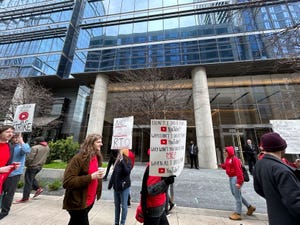
Google Is Feeling the Heat From Its Own Employees - CNET
On the heels of Google laying off 12,000 employees in January, a series of protests took place last week in New York, California and Texas that showed mounting worker unrest.
On Wednesday, Google’s raters, which evaluate the quality of ads, submitted a petition at the company’s headquarters in Mountain View, California, demanding better pay. The following day, a protest erupted outside Google’s offices in New York criticizing the search giant over mass layoffs. Capping off the work week on Friday, more than 40 YouTube Music workers with Cognizant, a company that contracts under YouTube owner and Google parent Alphabet, went on strike in Austin, Texas, over a new return-to-office policy.
These mark the latest incidents in a series of contentious issues between the search giant and its workers over the years. In 2018, more than 20,000 workers walked out of 50 offices to protest the company’s handling of alleged sexual assault and misconduct. The next year, protests took place at the company’s San Francisco office condemning management for retaliating against two activist workers. Google also fired researchers who questioned its AI systems, including prominent AI researchers Timnit Gebru and Margaret Mitchell in 2020 and 2021 respectively, or engaged in workplace activism. Ariel Koren, a worker who denounced the company’s dealings with Israel, was abruptly told to relocate to Brazil last March. She ultimately decided to leave the company.
These latest incidents, however, have the extra sting of coming so soon after a massive round of layoffs.
Google and Cognizant didn’t immediately respond to requests for comment. The Alphabet Workers Union, part of the Communications Workers of America, referred to its press releases when asked for comment.
YouTube Music workers went on strike over unfair labor practices, saying the new return-to-office policy, which takes effect today, would threaten their safety and livelihoods. The AWU argued that because workers are paid as little as $19 an hour, relocation, travel and child care costs would present too high a burden. The AWU also says that a forced return-to-office requirement would hinder ongoing unionization efforts by Cognizant workers.
“No workers should be paid so little that they cannot afford to go back to work in the office, and no worker should be forced to return to the office when it is clear we can effectively accomplish our work from home,” Neil Gossell, a YouTube Music contractor with Cognizant and AWU-CWA member, said in a press release.
Unlike full-time Google employees, contractors usually don’t get the same benefits and pay. In 2019, 54% of Google’s workforce were contractors. In June, Google backed down from its return-to-office demands, but the company is now looking to bring workers back.
“Compared to Google’s full-time employees, these critical workers receive worse pay, inferior benefits, bad management and arbitrary policies,” according to the press release. “The forced RTO is the last straw.”
Cognizant workers and the AWU are awaiting a ruling by the National Labor Relations Board to recognize Alphabet and Cognizant as joint employers so that both companies can be forced to the negotiating table.
Union efforts do seem to be taking form. Google Fiber workers unionized in March, while workers at Appen, which contracts with Google on the testing and evaluation of the company’s search algorithm, saw a pay bump from $10 to $14.50 an hour.
Meanwhile, the 5,000 Google raters demanding a minimum standard on wage and benefits delivered the petition to Senior Vice President Prabhakar Raghavanan at Google’s headquarters in Mountain View, California, on Wednesday. The AWU says raters make as little as $10 an hour. Raters complain that not only have their hours been cut, but that more demands have been put on them, and that they’re exposed to violent and disturbing content.
“I could work at Wendy’s and make more than what I make working for Google,” Michelle Curtis, a Google rater, said in a press release.
Google workers in New York rallied outside the company’s offices across from Chelsea Market on Thursday, the same day fourth-quarter earnings results were released. The Googlers Against Greed protest was in response to the layoffs in January. Google workers argued that while Alphabet reported $110 billion in cash on hand, spent $17.5 billion on stock buybacks and had a third-quarter profit of $17 billion, it still laid off 12,000 workers.
“Our executives decided to lay off 12,000 of our co-workers, including many on medical or parental leave, as well as many with over a decade of loyal service,” according to a press release by the CWA. “In a time of record profits per employee, Alphabet’s executives traded the livelihoods of 12,000 of our co-workers for greater personal wealth and to appease the market.”
Google will save an estimated $1 billion per quarter with the layoffs, according to the press release.
Google itself has been pulling back on spending, slowing the rate of hiring and cutting back on employee travel. CEO Sundar Pichai asked employees to help him on a “simplicity sprint” that would crowdsource ideas to streamline processes during an all-hands meeting in July. The changes came as earnings results throughout 2022 fell short of analyst expectations.
Fourth-quarter earnings results from Thursday revealed that the company is down in both search, website and YouTube ad revenue. While Google posted $13.6 billion in net income, it was down 34% compared to a year prior.
“We are here to show that we will not take these layoffs lying down while the company continues to make so much in profit,” said Kelly Keniston, a software engineer at Google, during the protest in New York.
She went on to read testimonials from employees who were laid off: “Google employees have livelihood stakes in the company … and that’s literally how these millionaires control us. By giving us so much, it’s virtually impossible to rebel, to wish bad on their companies. It’s literally the definition of manipulation.”

